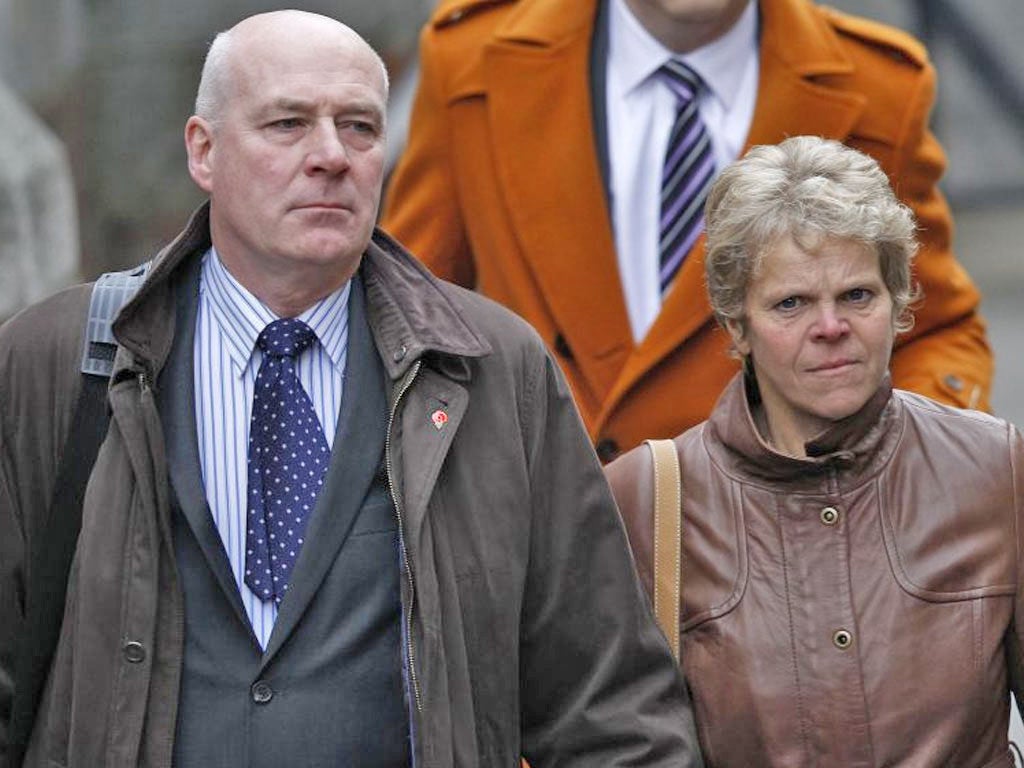'She has picked up her voicemails, Bob. She is alive!'
Milly Dowler's mother tells inquiry of false hopes raised by hacking

The psychological trauma inflicted by phone hacking was revealed in full yesterday when the parents of Milly Dowler relived the elation and hope they felt upon suddenly reaching her voicemail and concluding she was still alive.
Sally and Bob Dowler, who were speaking publicly for the first time since the revelation in July that the News of the World had accessed the teenager's phone messages, told the Leveson Inquiry that the scale and gravity of the illegal eavesdropping on voicemails by journalists must be understood by the public.
Sitting beside her husband while a hushed courtroom at the Royal Courts of Justice listened, Ms Dowler gave a vivid account of how, after many days of calling her daughter's mobile phone and hearing an automated recording that indicated her voicemail inbox was full, she suddenly heard Milly's recorded voice and was able to leave a message. "I rang her phone," Ms Dowler said. "It clicked through on to her voicemail, so I heard her voice and it was just like: 'She's picked up her voicemails, Bob. She's alive!'" Ms Dowler added: "I told my friends, 'She's picked up her voicemail, She's picked up her voicemail'."
In an incendiary first day of evidence from victims of press intrusion, Lord Leveson also heard:
* A claim by actor Hugh Grant that a story published by the The Mail on Sunday in 2007 about him flirting with a "plummy-voiced" woman could only have come from hacked voicemails.
* Allegations from a solicitor for celebrities and public figures that newspapers routinely balanced the cost of any damages arising from a "kiss and tell" against the revenues the story would generate.
During what seemed at times to be consciously restrained testimony by the Dowlers, whose treatment by the NOTW rendered the brand so toxic that Rupert Murdoch's News International decided to close it, the couple revealed the effects of the hacking when it was finally disclosed to them.
Ms Dowler said: "I didn't sleep for about three nights because you replay everything in your mind and just think, 'Oh, that makes sense now, that makes sense'."
It was only on the eve of the trial of Levi Bellfield, the former bouncer who was convicted of Milly's murder this summer, that the family discovered they had been able to leave their voicemail because messages on her phone had been listened to by the NOTW and deleted – to enable others to be left by her family and friends. Bellfield probably murdered the Surrey schoolgirl within hours of abducting her close to her home in Walton-on-Thames.
Glenn Mulcaire, the private investigator employed by the Sunday paper to obtain information and eavesdrop on voicemails, last night insisted he was not personally responsible for deleting messages and "had no reason to do so". In a statement from his solicitor, he said he believed documents set to be released by Surrey Police would "shed light on the actions he took then and the basis of them".
Ms Dowler said she could not remember how detectives reacted when she told them that her daughter seemed to have accessed her voicemails. An investigation by The Independent established last month that Surrey Police knew within the first weeks of the hunt for Milly that the NOTW had been accessing her voicemails but took no action against the paper.
The inquiry heard it was possible that the mobiles of the Dowlers themselves were also accessed after they were photographed on a private walk to retrace their daughter's final steps seven weeks after Milly disappeared in March 2002.
Three days after the couple had carried out the walk, checking "missing" posters pinned up by family and friends, a photograph was published of Ms Dowler reaching up to touch one. She said: "How on earth did they know we were doing that walk on that day? It felt like such an intrusion into a really private grief moment."
Mr Dowler, who along with his wife said there were no specific suggestions they wanted to make for improved press regulation, said there were wider lessons to be learned. "There is a much bigger picture, obviously," he said. "It was extremely important that... people understand exactly what went on."
